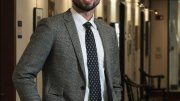As a public defender, Andrew Manuel Crespo ’05, J.D. ’08, met his first client on Christmas Eve 2011. Handcuffed and shackled, the client had just celebrated, in juvenile lockup, his eighth birthday. Seated, his feet didn’t touch the floor. “I remember walking in and just being stunned,” recalls the newly appointed assistant law professor. “Like, this is my job now: I represent eight-year-olds who are in handcuffs.” A two-time Supreme Court clerk and the first Latino president of the Harvard Law Review, Crespo aims to interrogate the gap between the criminal-justice system’s ideals and its reality. That gap “crystallized” for him during first-year “Criminal Law”; his own students now probe the same disparity in Crespo’s popular course “Popular Criminalism.” Before turning to law, Crespo was a social-studies concentrator who examined how Boston community organizations knit connections among ethnic groups. His thesis adviser, Kennedy School senior lecturer Marshall Ganz, recalls a student who could “dive into the nitty-gritty” and still master the “broader context”—like a great composer, able to originate a theme, but also “get every note right.” The musical analogy is apt, given Crespo’s guiltiest secret: a cappella. He performed with the Veritones throughout college, and a Veritones friend introduced him to his future wife—Abby Shafroth ’04, J.D. ’08, now a civil-rights attorney—on the Dudley Co-op dance floor. Well aware that the justice system is flawed, Crespo nevertheless connects it to his favorite college memories of “long discussions and debates” among his best friends. “The law,” he says, “continues that same conversation about our social fabric—the values we care about, and how we make them real, in lived, daily experience.”
Portrait of public defender Andrew Manuel Crespo
Portrait of public defender Andrew Manuel Crespo
Andrew Crespo ’05 connects the law to real life.

You might also like
How a Harvard Hockey Legend Became a Needlepoint Artist
Joe Bertagna’s retirement project recreates figures from Boston sports history.
Introductions: Mallika Monteiro
A conversation with a beer industry executive
Mount Vernon, Historic Preservation, and American Politics
Anne Neal Petri promotes George Washington and historic literacy.
Most popular
Explore More From Current Issue

How a Harvard and Lesley Group Broke Choir Singing Wide Open
Cambridge Common Voices draws on principles of universal design.

Inside Harvard’s Most Egalitarian School
The Extension School is open to everyone. Expect to work—hard.





